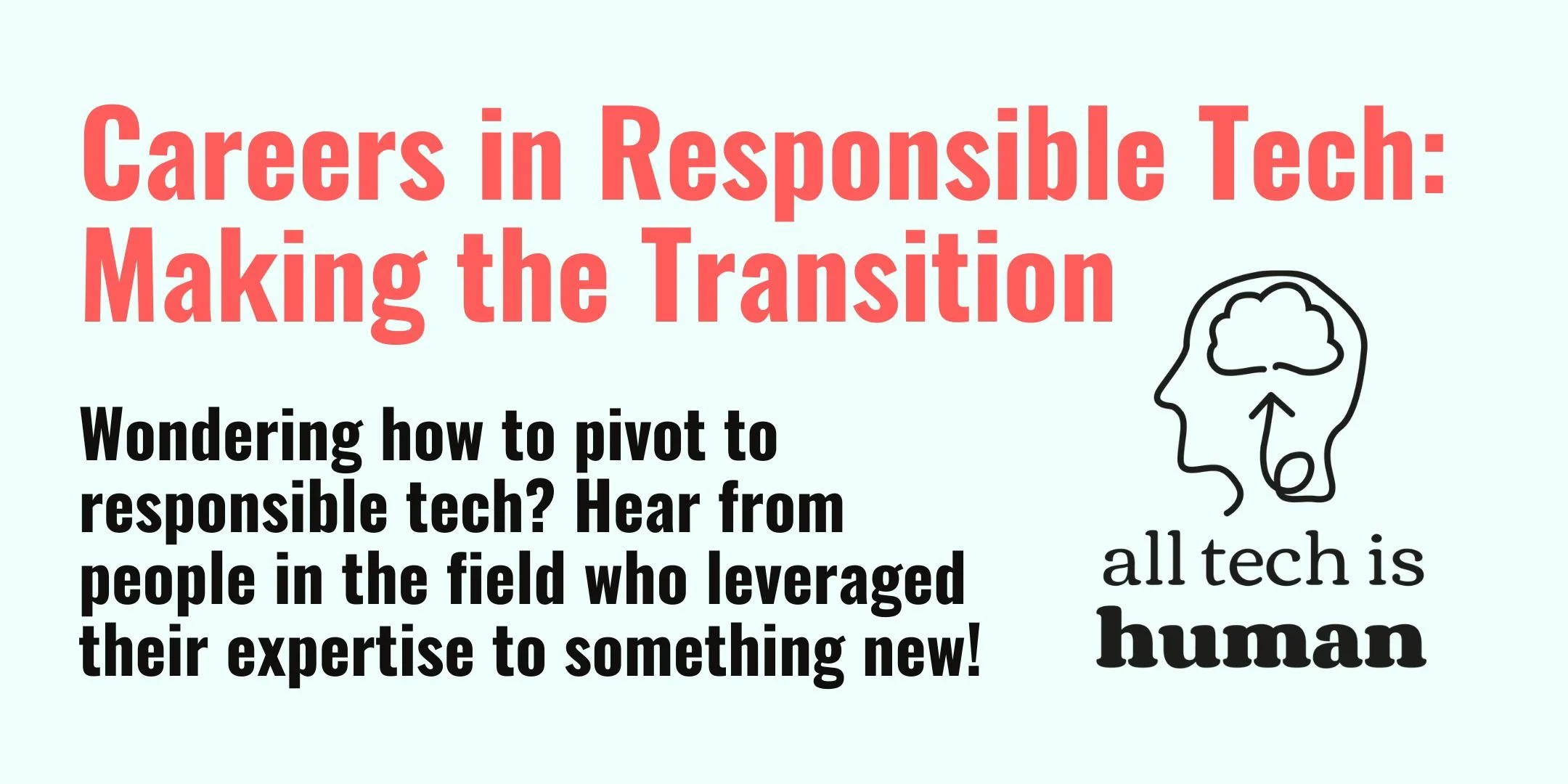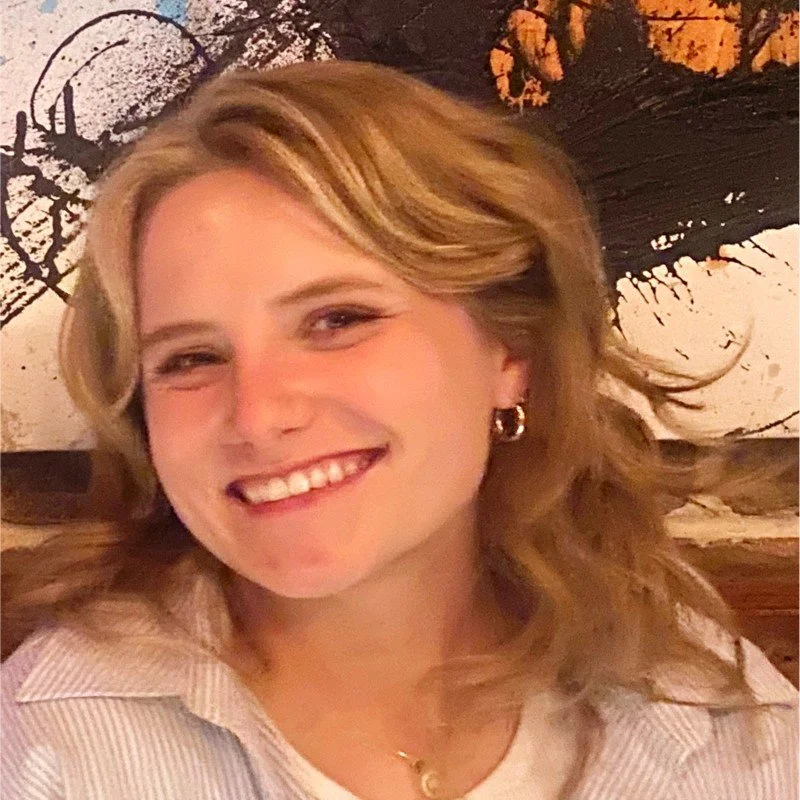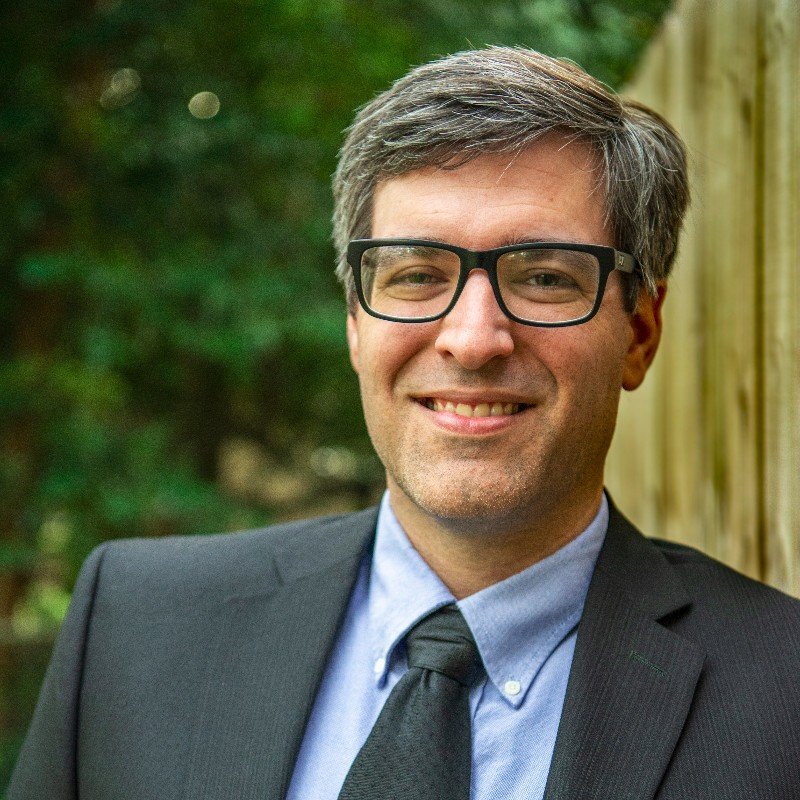Careers in Responsible Tech: Making the Transition - Highlights and Takeaways 💡
(Friday, February 23, 2024, New York, NY) All Tech Is Human hosted a special livestream focused on how people can make a career transition to responsible technology with a world-class panel of experts on Thursday, February 22, 2024.
All Tech Is Human Program Manager Sarah Welsh moderated a panel featuring: Kyle Boerstler, PhD (Senior Data Scientist, Activision), Elizabeth Thompson (MS Data Science @ NC State | Researcher @ UNC), Daniel Siegel (AI & Malicious Actor Analyst, Stealth), and Megan Shahi (Director, Technology Policy at Center for American Progress).
Livestream participants were part of All Tech Is Human’s globally-renowned Mentorship Program. Our mentorship program features hundreds of experienced mentors working to develop emerging talent across a range of fields related to Responsible Tech including Responsible AI, Tech Policy, Trust & Safety, Responsible Design, and more.
Are you looking for a new role in Responsible Tech? The Responsible Tech Job Board is the premiere resource to discover new career opportunities in the field, featuring hundreds of roles across the emerging field.
We’ve curated key highlights from our careers livestream below. You can watch the full livestream now!
What was something you did early in your transition to responsible tech that you would recommend to others in a similar position?
“One of the things that I really think is important, especially as you're trying to make this transition or just get involved in any particular industry, is finding your particular niche.” Daniel Siegel said of his experience. “What do you exclusively know a ton about? How does it relate to that subject area so that you can really capitalize on it?” Siegel continued.
Elizabeth Thompson, a researcher at University of North Carolina, recommended people find a role that will allow the to grow and to take advantage of the benefits offered by a position.
"I knew that my experience working as professional journalist put me in a good place for journalism related jobs, but I was really interested in growing my technical expertise. So I used my journalism experience, which was my niche, in order to find a role at the intersection of those things learning more technical skills in a research role, where also I work at a public university, so I'm also able to take classes for free. Finding that way to get education as part of my job really helped me go to the next level so that I was able to apply for master's degrees and actually start to use the knowledge that I was learning In my job.” Thompson said. “I think being able to find roles where you can grow is really important, especially if you're in that pivot phase, because sometimes you may not be able to make that exact pivot you want to make right now. You need to grow and learn in order to be where you want to be.”
Making the transition to responsible tech does not require a technical background. The field requires a diverse range of backgrounds and voices to co-create a better tech future. Megan Shahi recalled how her non-traditional background applies to the field.
“I'm here to say you don't need to have a technical background to do tech work. I am a walking example of this. I studied Arabic for four years of college. It’s very possible if you are curious about it or not sure about it. You are a candidate for doing this work.” Shahi said. “I really think it's a matter of getting experience that allows you to really understand how an organization works, how different functions work, and how you can build consensus among people who may not have shared goals or motivations.”
One of the primary ways to get noticed in responsible tech is to develop connections through networking. Individuals should invest time in platforms like LinkedIn to help grow their networks, according to Kyle Boerstler, PhD.
“You're one of thousands of people who could go for any job that a lot of people are either under, over, or exactly qualified for. How do you stand out? You have to pitch yourself. You have to build up your platform. You have to build up your network and you have to showcase what makes you unique.” Boerstler said.
What are the best things you can do to become a competitive candidate?
“As someone who came from a social science background, and I think this is just generally true about the question, no matter where you come from, projects, projects, projects. If you can have something substantial to be talking about in interviews, have something substantial to be talking about on LinkedIn, or just with people around you.” Daniel Siegel said."
“I think the biggest thing that you can just do for yourself is to not let yourself get in the way of your own ambitions and also honor the great things that you've learned also from your humanities, your social, social sciences, background, all of those things. Learning how to take in information and explain it working with different kinds of people. Those are all going to be valuable in both more of a humanities oriented job and a technical job.” Elizabeth Thompson said.
“If you're coming from a humanities or a social science background and you've done any sort of research in those fields, you have a superpower. Almost no one else has the ability to come to sometimes hundreds of years of research, sometimes thousands of years of research, depending on what field you're in, and to take that wealth of information and to learn how to synthesize it into not only easy to convey and concise bullet points of what's important, but then also turn that into what's like the actionable insights, like what's relevant here.” Kyle Boerstler said.
How do you define a successful career pivot?
“I don't know all the answers on the first day, or maybe the first month…but it is where I feel myself growing and learning in the space that I specifically want to be and I think this can look and feel really different depending on the person and the phase of life.” Megan Shahi said.
“It's not just pivoting to a new job. I think when I decided that I wanted to leave my journalism career, there were a lot of things that I thought my lifestyle doesn't look the way that I want it to look in this career. The way I thought of what should I do next and what do I want going into this next phase of my career has less to do with a job title and more to do with what my day-to-day looks like. Am I constantly learning new things? Do I also have work-life balance? And that's where I found that happy medium also with my passions, but I think a lot of times in like the career pivot space.” Elizabeth Thompson
I think a successful pivot requires you to be comfortable with the gray area. Right now, I'm still in grad school doing a lot of research, absolutely loving it, and having great opportunities to do a lot of contract work, which is not something I thought I would be doing when I made this pivot. But now I'm thinking about just continuing to do contract work rather than seek that full time job. But I'm still like leaving open the concept of a full time job. Being really comfortable with this weird gray area where you don't know necessarily what's coming next, but you're really doing a lot of the work that you're interested in.” Daniel Siegel said.
About All Tech Is Human
All Tech Is Human is a non-profit committed to building the world’s largest multistakeholder, multidisciplinary network in Responsible Tech. This allows us to tackle wicked tech & society issues while moving at the speed of tech, leverage the collective intelligence of the community, and diversify the traditional tech pipeline. Together, we work to solve tech & society’s thorniest issues.
Join our working groups on Cyber & Democracy and Tech Policy
Read our reports, such as our Responsible Tech Guide and our recent Responsible Tech Org List 2024
Join our Slack community of over 7k members across 89 countries, with numerous individuals focused on creating healthy digital spaces
Read our Responsible Tech Job Board and join our talent pool






